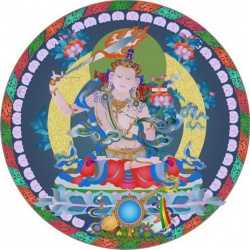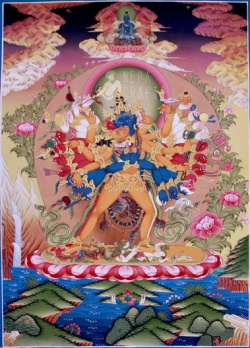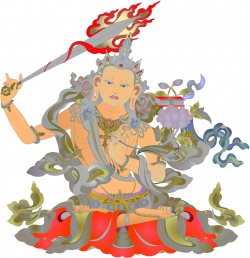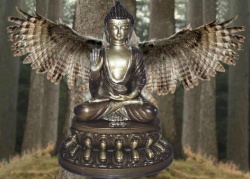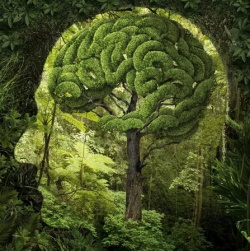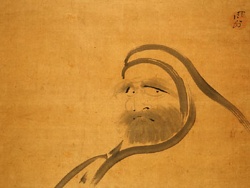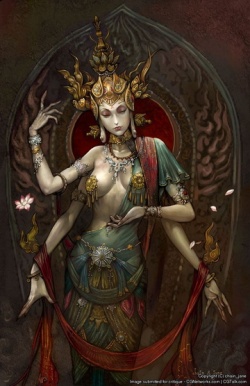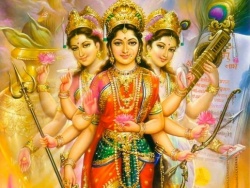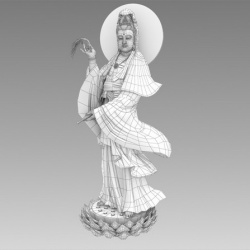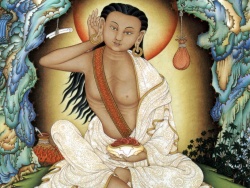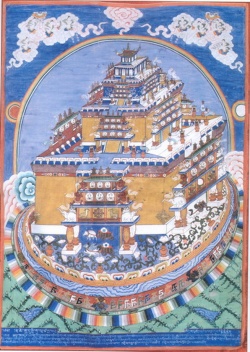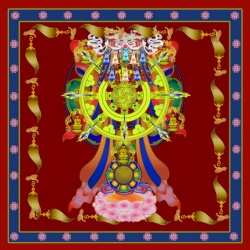The Gospel of Buddha:Chapter 51: Simha's Question Concerning Annihilation
At that time many distinguished citizens were sitting together assembled in the town-hall
and spoke in many ways in praise of the Buddha, of the Dharma, and of the Sangha.
Simha, the general-in-chief, a disciple of the Niggantha sect, was sitting among them.
And Simha thought: "Truly, the Blessed One must be the Buddha, the Holy One.
I will go and visit him." [1]
Then Simha, the general, went to the place
where the Niggantha chief, Nataputta, was;
and having approached him, he said:
"I wish, Lord, to visit the samana Gotama." [2]
Nataputta said:
"Why should you, Simha,
who believe in the result of actions according to their moral merit,
go to visit the samana Gotama, who denies the result of actions;
he teaches the doctrine of non-action;
and in this doctrine he trains his disciples." [3]
Then the desire to go and visit the Blessed One,
which had arisen in Simha, the general, abated. [4]
Hearing again the praise of the Buddha, of the Dharma, and of the Sangha,
Simha asked the Niggantha chief a second time;
and again Nataputta persuaded him not to go. [5]
When a third time the general heard some men of distinction
extol the merits of the Buddha, the Dharma, and the Sangha,
the general thought:
"Truly the samana Gotama must be the Holy Buddha.
What are the Nigganthas to me,
whether they give their consent or not?
I shall go without asking their permission
to visit him, the Blessed One, the Holy Buddha." [6]
And Simha, the general, said to the Blessed One:
"I have heard, Lord,
that the samana Gotama denies the result of actions;
he teaches the doctrine of non-action,
saying that the action of sentient beings do not receive their reward,
for he teaches annihilation and the contemptibleness of all things;
and in this doctrine he trains his disciples.
Teachest thou the dong away of the soul
and the burning away of man's being?
Pray tell me, Lord, do those who speak thus say the truth,
or do they bear false witness against the Blessed One,
passing off a spurious Dharma as thy Dharma?" [7]
The Blessed One said: [8]
"There is a way, Simha,
in which one who says so, is speaking truly of me,
on the other hand, Simha,
there is a way in which one who says the opposite
is speaking truly of me, too.
Listen, and I will tell thee: [9]
"I teach, simha,
the not-doing of such actions as are unrighteous,
either by deed, or by word, or by thought;
I teach the not-bringing about of all those conditions of heart which are evil and not good.
However, I teach, Simha,
the doing of such actions as are righteous,
by deed, by word, and by thought;
I teach the bringing about
of all those conditions of heart
which are good and not evil. [10]
"I teach, Simha,
that all the conditions of heart which are evil and not good,
unrighteous actions by deed, by word, and by thought, must be burnt away.
He who has freed himself, Simha,
from all those conditions of heart
which are evil and not good,
he who has destroyed them as a palm-tree which is rooted out,
so that they cannot grow up again,
such a man has accomplished the eradication of self. [11]
"I proclaim, Simha,
the annihilation of egotism, of lust, of ill-will, of delusion.
However, I do not proclaim the annihilation
of forbearance, of love, of charity, and of truth. [12]
"I deem, Simha, unrighteous actions contemptible,
whether they be performed by deed, or by word, or by thought;
but I deem virtue and righteousness praiseworthy." [13]
And Simha said:
"One doubt still lurks in my mind
concerning the doctrine of the Blessed One.
Will the Blessed One consent to clear the cloud away
so that I may understand the Dharma as the Blessed One teaches it?" [14]
The Tathagata having given his consent, Simha continued:
"I am a soldier, O Blessed One,
and am appointed by the king
to enforce his laws and to wage his wars.
Does the Tathagata who teaches kindness without end
and compassion with all sufferers,
permit the punishment of the criminal?
and further, does the Tathagata declare
that it is wrong to go to war for the protection
for our homes, our wives, our children, and our property?
Does the Tathagata teach the doctrine of a complete self-surrender,
so that I should suffer the evil-doer to do what he pleases
and yield submissively to him who threatens to take by violence what is my own?
Does the Tathagata maintain that all strife, including such warfare
as is waged for a righteous cause, should be forbidden?" [15]
The Buddha replied:
"He who deserves punishment must be punished,
and he who is worthy of favour must be favoured.
Yet at the same time he teaches to do no injury
to any living being but to be full of love and kindness.
These injuncions are not contradictory,
for whosoever must be punished for the crimes which he has committed,
suffers his injury not through the ill-will of the judge
but on account of his evil-doing.
His own acts have brought upon him the injury
that the executer of the law inflicts.
When a magistrate punishes, let him not harbour hatred in his breast,
yet a murderer, when put to death,
should consider that this is the fruit of his own act.
As soon as he will understand that the punishment will purify his soul,
he will no longer lament his fate but rejoice at it." [16]
And the Blessed One continued:
"The Tathagata teaches that all warfare in which man tries to slay his brother is lamentable,
but he does not teach that those who go to war in a righteous cause
after having exhausted all means to preserve the peace are blame-worthy.
He must be blamed who is the cause of war. [17]
"The Tathagata teaches a complete surrender of self,
but he does not teach a surrender of anything
to those powers that are evil, be they men or gods or the elements of nature.
Struggle must be, for all life is a struggle of some kind.
But he that struggles should look to it
lest he struggle in the interest of self against truth and righteousness. [18]
"He who struggles in the interest of self,
so that he himself may be great or powerful or rich or famous,
will have no reward, but he who struggles for righteousness and truth,
will have great reward, for even his defeat will be a victory. [19]
"Self is not a fit vessel to receive any great success;
self is small and brittle
and its contents will soon be split for the benefit,
and perhaps also for the curse, of others. [20]
"Truth, however, is large enough
to receive the yearnings and aspirations of all selves
and when the selves break like soap-bubbles,
their contents will be preserved
and in the truth they will lead a life everlasting. [21]
"He who goeth to battle, O Simha,
even though it be in a righteous cause,
must be prepared to be slain by his enemies,
for that is the destiny of warriors;
and should his fate overtake him
he has no reason for complaint. [22]
"But he who is victorious
should remember the instability of earthly things.
His success may be great,
but be it ever so great the wheel of fortune may turn again
and bring him down into the dust. [23]
"However, if he moderates himself
and, extinguishing all hatred in his heart
lifts his down-trodden adversary up and says to him,
'Come now and make peace and let us be brothers,'
he will gain a victory that is not a transient success,
for its fruits will remain forever. [24]
"Great is a successful general, O Simha,
but he who had conquered self is the greater victor. [25]
"The doctrine of the conquest of self, O Simha,
is not taught to destroy the souls of men, but to preserve them.
He who has conquered self is more fit to live,
to be successful, and to gain victories
than he who is the slave of self. [26]
"He whose mind is free from the illusion of self,
will stand and not fall in the battle of life. [27]
"He whose intentions are righteousness and justice,
will meet with no failure,
but be successful in his enterprises
and his success will endure. [28]
"He who harbours in his heart love of truth
will live and not die,
for he has drunk the water of immortality. [29]
"Struggle then, O general, courageously;
and fight thy battles vigorously,
but be a soldier of truth
and the Tathagata will bless thee." [30]
When the Blessed One had spoken thus,
Simha, the general, said:
"Glorious Lord, glorious Lord!
Thou hast revealed the truth.
Great is the doctrine of the Blessed One.
Thou, indeed, art the Buddha, the Tathagata, the Holy One.
Thou art the teacher of mankind.
Thou showest us the road of salvation,
for this indeed is true deliverance.
He who follows thee will not miss the light to enlighten his path.
He will find blessedness and peace.
I take my refuge, Lord, in the Blessed One,
and in his doctrine, and in his brotherhood.
May the Blessed One receive me from this day forth
while my life lasts as a disciple who has taken refuge in him." [31]
And the Blessed One said:
"Consider first, Simha, what thou doest.
It is becoming that persons of rank like thyself
should do nothing without due consideration." [32]
Simha's faith in the Blessed One increased. He replied:
"Had other teachers, Lord, succeeded in making me their disciple,
they would carry around their banners through the whole city of Vesali, shouting:
'Simha, the general has become our disciple!
For the second time, Lord,
I take my refuge in the Blessed One,
and in the Dharma, and in the Sangha;
may the Blessed One receive me from this day forth while my life lasts
as a disciple who has taken his refuge in him." [33]
Said the Blessed One:
"For a long time, Simha,
offerings have been given to the Nigganthas in thy house.
Thou shouldst therefore deem it right also in the future
to give them food when they come to thee on their alms-pilgrimage." [34]
And Simha's heart was filled with joy. He said:
"I have been told, Lord:
'The samana Gotama says: To me alone and to nobody else should gifts be given.
My pupils alone and the pupils of no one else should receive offerings.'
But the Blessed One exhorts me to give also to the Nigganthas.
Well, Lord, we shall see what is seasonable.
For the third time, Lord, I take refuge in the Blessed One,
and in his Dharma, and in his fraternity." [35]
Continue Reading
- The Gospel of Buddha: Preface
- The Gospel of Buddha:Chapter 01: Rejoice
- The Gospel of Buddha:Chapter 02: Samsara and Nirvana
- The Gospel of Buddha:Chapter 03: Truth the Saviour
- The Gospel of Buddha:Chapter 04: The Bodhisatta's Birth
- The Gospel of Buddha:Chapter 05: The Ties of Life
- The Gospel of Buddha:Chapter 06: The Three Woes
- The Gospel of Buddha:Chapter 07: The Bodhisatta's Renunciation
- The Gospel of Buddha:Chapter 08: King Bimbisara
- The Gospel of Buddha:Chapter 09: The Bodhisatta's Search
- The Gospel of Buddha:Chapter 10: Uruvela, the Place of Mortification
- The Gospel of Buddha:Chapter 11: Mara, the Evil One
- The Gospel of Buddha:Chapter 12: Enlightenment
- The Gospel of Buddha:Chapter 13: The First Converts
- The Gospel of Buddha:Chapter 14: Brahma's Request
- The Gospel of Buddha:Chapter 15: Upaka
- The Gospel of Buddha:Chapter 16: The Sermon at Benares
- The Gospel of Buddha:Chapter 17: The Sangha
- The Gospel of Buddha:Chapter 18: Yasa, the Youth of Benares
- The Gospel of Buddha:Chapter 19: Kassapa
- The Gospel of Buddha:Chapter 20: The Sermon at Rajagaha
- The Gospel of Buddha:Chapter 21: The King's Gift
- The Gospel of Buddha:Chapter 22: Sariputta and Moggallana
- The Gospel of Buddha:Chapter 23: Anathapindika
- The Gospel of Buddha:Chapter 24: The Sermon on Charity
- The Gospel of Buddha:Chapter 25: Jetavana
- The Gospel of Buddha:Chapter 26: The Three Characteristics and the Uncreate
- The Gospel of Buddha:Chapter 27: The Buddha's Father
- The Gospel of Buddha:Chapter 28: Yasodhara
- The Gospel of Buddha:Chapter 29: Rahula
- The Gospel of Buddha:Chapter 30: Jivaka, the Physician
- The Gospel of Buddha:Chapter 31: The Buddha's Parents Attain Nirvana
- The Gospel of Buddha:Chapter 32: Women Admitted to the Sangha
- The Gospel of Buddha:Chapter 33: The Bhikkhus' Conduct Toward Women
- The Gospel of Buddha:Chapter 34: Visakha
- The Gospel of Buddha:Chapter 35: The Uposatha and Patimokkha
- The Gospel of Buddha:Chapter 36: The Schism
- The Gospel of Buddha:Chapter 37: The Re-establishment of Concord
- The Gospel of Buddha:Chapter 38: The Bhikkhus Rebuked
- The Gospel of Buddha:Chapter 39: Devadatta
- The Gospel of Buddha:Chapter 40: Name and Form
- The Gospel of Buddha:Chapter 41: The Goal
- The Gospel of Buddha:Chapter 42: Miracles Forbidden
- The Gospel of Buddha:Chapter 43: The Vanity of Worldliness
- The Gospel of Buddha:Chapter 44: Secrecy and Publicity
- The Gospel of Buddha:Chapter 45: The Annihilation of Suffering
- The Gospel of Buddha:Chapter 46: Avoiding the Ten Evils
- The Gospel of Buddha:Chapter 47: The Preacher's Mission
- The Gospel of Buddha:Chapter 48: The Dhammapada
- The Gospel of Buddha:Chapter 49: The Two Brahmans
- The Gospel of Buddha:Chapter 50: Guard the Six Quarters
- The Gospel of Buddha:Chapter 51: Simha's Question Concerning Annihilation
- The Gospel of Buddha:Chapter 52: All Existence is Spiritual
- The Gospel of Buddha:Chapter 53: Identity and Non-Identity
- The Gospel of Buddha:Chapter 54: The Buddha Omnipresent
- The Gospel of Buddha:Chapter 55: One Essence, One Law, One Aim
- The Gospel of Buddha:Chapter 56: The Lesson Given to Rahula
- The Gospel of Buddha:Chapter 57: The Sermon on Abuse
- The Gospel of Buddha:Chapter 58: The Buddha Replies to the Deva
- The Gospel of Buddha:Chapter 59: Words of Instruction
- The Gospel of Buddha:Chapter 60: Amitabha
- The Gospel of Buddha:Chapter 61: The Teacher Unknown
- The Gospel of Buddha:Chapter 62: Parables
- The Gospel of Buddha:Chapter 63: The Widow's Two Mites and the Parable of the Three Merchants
- The Gospel of Buddha:Chapter 64: The Man Born Blind
- The Gospel of Buddha:Chapter 65: The Lost Son
- The Gospel of Buddha:Chapter 66: The Giddy Fish
- The Gospel of Buddha:Chapter 67: The Cruel Crane Outwitted
- The Gospel of Buddha:Chapter 68: Four Kinds of Merit
- The Gospel of Buddha:Chapter 69: The Light of the World
- The Gospel of Buddha:Chapter 70: Luxurious Living
- The Gospel of Buddha:Chapter 71: The Communication of Bliss
- The Gospel of Buddha:Chapter 72: The Listless Fool
- The Gospel of Buddha:Chapter 73: Rescue in the Desert
- The Gospel of Buddha:Chapter 74: The Sower
- The Gospel of Buddha:Chapter 75: The Outcast
- The Gospel of Buddha:Chapter 76: The Woman at the Well
- The Gospel of Buddha:Chapter 77: The Peacemaker
- The Gospel of Buddha:Chapter 78: The Hungry Dog
- The Gospel of Buddha:Chapter 79: The Despot
- The Gospel of Buddha:Chapter 80: Vasavadatta
- The Gospel of Buddha:Chapter 81: The Marriage-Feast in Jambunada
- The Gospel of Buddha:Chapter 82: A Party in Search of a Thief
- The Gospel of Buddha:Chapter 83: In the Realm of Yamaraja
- The Gospel of Buddha:Chapter 84: The Mustard Seed
- The Gospel of Buddha:Chapter 85: Following the Master Over the Stream
- The Gospel of Buddha:Chapter 86: The Sick Bhikkhu
- The Gospel of Buddha:Chapter 87: The Patient Elephant
- The Gospel of Buddha:Chapter 88: The Conditions of Welfare
- The Gospel of Buddha:Chapter 89: Sariputta's Faith
- The Gospel of Buddha:Chapter 90: Pataliputta
- The Gospel of Buddha:Chapter 91: The Mirror of Truth
- The Gospel of Buddha:Chapter 92: Ambapali
- The Gospel of Buddha:Chapter 93: The Buddha's Farewell Address
- The Gospel of Buddha:Chapter 94: The Buddha Announces His Death
- The Gospel of Buddha:Chapter 95: Chunda, the Smith
- The Gospel of Buddha:Chapter 96: Metteyya
- The Gospel of Buddha:Chapter 97: The Buddha's Final Entering into Nirvana
- The Gospel of Buddha:Chapter 98: The Three Personalities of the Buddha
- The Gospel of Buddha:Chapter 99: The Purpose of Being
- The Gospel of Buddha:Chapter 100: The Praise of All the Buddhas


